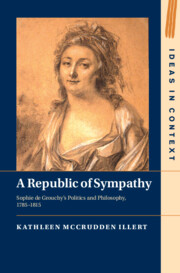Book contents
- A Republic of Sympathy
- Ideas In Context
- A Republic of Sympathy
- Copyright page
- Dedication
- Contents
- Acknowledgements
- Abbreviations
- Introduction
- Chapter 1 The Letters, 1786
- Chapter 2 The Wheel, 1785–1789
- Chapter 3 The Revolution, 1789–1793
- Chapter 4 The Republic, 1791–1793
- Chapter 5 The Publication, 1794–1799
- Chapter 6 The Mask, 1799–1804
- Chapter 7 The Poet, 1804–1810
- Chapter 8 The Thread, 1798–1815
- Conclusion
- Appendix: Attributions
- Bibliography
- Index
Conclusion
Published online by Cambridge University Press: 18 December 2024
- A Republic of Sympathy
- Ideas In Context
- A Republic of Sympathy
- Copyright page
- Dedication
- Contents
- Acknowledgements
- Abbreviations
- Introduction
- Chapter 1 The Letters, 1786
- Chapter 2 The Wheel, 1785–1789
- Chapter 3 The Revolution, 1789–1793
- Chapter 4 The Republic, 1791–1793
- Chapter 5 The Publication, 1794–1799
- Chapter 6 The Mask, 1799–1804
- Chapter 7 The Poet, 1804–1810
- Chapter 8 The Thread, 1798–1815
- Conclusion
- Appendix: Attributions
- Bibliography
- Index
Summary
The conclusion turns to the implications of this study today, both in terms of our own view of liberal democratic society and the place of women in it. Grouchy shows us, firstly, how significant ideas can persist through an era of upheaval like the French Revolution: through constant negotiation, continual re-interrogation, and a determination to hold on to core concepts while adapting and discarding others. It argues, furthermore, that Grouchy’s politics and philosophy provide further evidence that women in history have thought and acted politically, but not always in the ways we commonly understand as ‘thinking’ or ‘acting’. It expresses the hope that the example of Grouchy will provide inspiration for other historians who wish to reconstruct the ideas of those in the past – in particular women and other marginalised groups – who did not do all, or any, of their thinking over the course of long texts. The reconstruction of this rich history will, in turn, help combat the problem of authority still encountered by women today in political and intellectual spheres. Finally, it ends with the suggestion that Grouchy’s thought may be of use for those twenty-first century theorists who argue that emotions are essential to successful liberal democracies.
Keywords
- Type
- Chapter
- Information
- A Republic of SympathySophie de Grouchy's Politics and Philosophy, 1785–1815, pp. 224 - 228Publisher: Cambridge University PressPrint publication year: 2024

